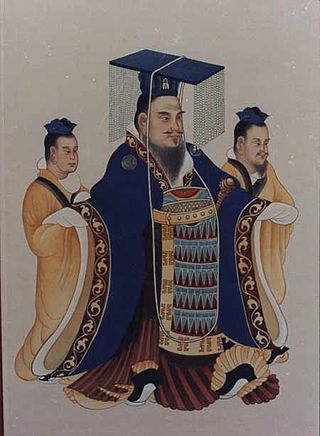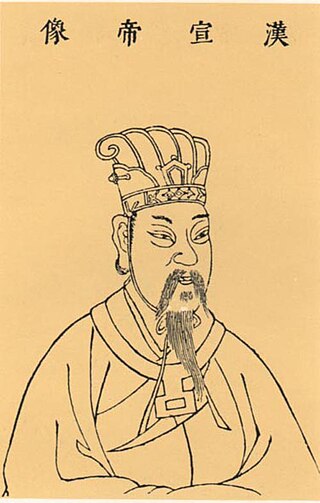Related Research Articles
This article concerns the period 119 BC – 110 BC.
This article concerns the period 129 BC – 120 BC.
Year 128 BC was a year of the pre-Julian Roman calendar. At the time it was known as the Year of the Consulship of Octavius and Rufus and the First Year of Yuanshuo. The denomination 128 BC for this year has been used since the early medieval period when the Anno Domini calendar era became the prevalent method in Europe for naming years.
Year 119 BC was a year of the pre-Julian Roman calendar. At the time it was known as the Year of the Consulship of Dalmaticus and Cotta and the Fourth Year of Yuanshou. The denomination 119 BC for this year has been used since the early medieval period, when the Anno Domini calendar era became the prevalent method in Europe for naming years.
Year 121 BC was a year of the pre-Julian Roman calendar. At the time it was known as the Year of the Consulship of Opimius and Allobrogicus and the Second Year of Yuanshou. The denomination 121 BC for this year has been used since the early medieval period, when the Anno Domini calendar era became the prevalent method in Europe for naming years.

Emperor Wu of Han, born Liu Che and courtesy name Tong, was the seventh emperor of the Han dynasty from 141 to 87 BC. His reign lasted 54 years – a record not broken until the reign of the Kangxi Emperor more than 1,800 years later – and remains the record for ethnic Han emperors. His reign resulted in a vast expansion of geopolitical influence for the Chinese civilization, and the development of a strong centralized state via governmental policies, economical reorganization and promotion of a hybrid Legalist–Confucian doctrine. In the field of historical social and cultural studies, Emperor Wu is known for his religious innovations and patronage of the poetic and musical arts, including development of the Imperial Music Bureau into a prestigious entity. It was also during his reign that cultural contact with western Eurasia was greatly increased, directly and indirectly.

Emperor Xuan of Han, born Liu Bingyi (劉病已), was the tenth emperor of the Han dynasty, reigning from 74 to 48 BC, and was one of the only four Western Han emperors to receive a temple name. During his reign, the Han dynasty prospered economically and militarily became a regional superpower, and was considered by many to be the peak period of the entire Han history. His time of rule, along with his predecessor Emperor Zhao's are known by historians as Zhaoxuan Restoration (昭宣中興). He was succeeded by his son Emperor Yuan after his death in 48 BC.
Wei Zifu, posthumously known as Empress Si of the Filial Wu or Wei Si Hou, was an empress consort during ancient China's Han dynasty. She was the second wife of the famous Emperor Wu and his spouse for 49 years. She stayed as his empress for 38 years, the second longest in Chinese history. She was the mother of Emperor Wu's heir apparent Liu Ju and a great-grandmother of Liu Bingyi, as well as an older half-sister of the famed general Wei Qing, a younger aunt of Huo Qubing, and a step-aunt of Han statesman Huo Guang.

Huo Qubing was a Chinese military general and politician of the Western Han dynasty during the reign of Emperor Wu of Han. He was a nephew of the general Wei Qing and Empress Wei Zifu, and a half-brother of the statesman Huo Guang. Along with Wei Qing, he led a campaign into the Gobi Desert of what is now Mongolia to defeat the Xiongnu nomadic confederation, winning decisive victories such as the Battle of Mobei in 119 BC. Huo Qubing was one of the most legendary commanders in Chinese history, and still lives on in Chinese culture today.
Wei Qing, courtesy name Zhongqing, born Zheng Qing in Linfen, Shanxi, was a Chinese military general and politician of the Western Han dynasty who was acclaimed for his campaigns against the Xiongnu, and his rags to riches life. He was a consort kin of Emperor Wu of Han as the younger half-brother of Emperor Wu's wife Empress Wei Zifu, and later the third husband of Emperor Wu's older sister Eldest Princess Yangxin. He was also the maternal uncle of Huo Qubing, another decorated Han general who participated in the war against the Xiongnu.

Li Guang was a Chinese military general of the Western Han dynasty. Nicknamed "Flying General" by the Xiongnu, he fought primarily in the campaigns against the nomadic Xiongnu tribes to the north of China. He was known to the Xiongnu as a tough opponent when it came to fortress defense, and his presence was sometimes enough for the Xiongnu to abort a siege.
The Battle of Mobei was a military campaign fought mainly in modern-day Mongolia, in the extreme cold and barren lands of the Gobi Desert. It was part of a major strategic offensive launched by the Han dynasty in the winter of January 119 BC, into the heartland of the nomadic Xiongnu. The campaign was a success for the Han, whose forces led by Wei Qing and Huo Qubing reached as far north as Lake Baikal.

The Emperor in Han Dynasty, also released under the title The Emperor Han Wu in some countries, is a 2005 Chinese historical drama television series based on the life of Emperor Wu of the Han dynasty. It uses the historical texts Records of the Grand Historian and Book of Han as its source material.
Li Ling, courtesy name Shaoqing, was a Chinese military general of the Western Han dynasty who served during the reign of Emperor Wu. He later defected to the Xiongnu after being defeated in an expedition in 99 BC.
This article concerns the period 99 BC – 90 BC.

The Han dynasty was the second imperial dynasty of China. It followed the Qin dynasty, which had unified the Warring States of China by conquest. It was founded by Liu Bang. The dynasty is divided into two periods: the Western Han and the Eastern Han, interrupted briefly by the Xin dynasty of Wang Mang. These appellations are derived from the locations of the capital cities Chang'an and Luoyang, respectively. The third and final capital of the dynasty was Xuchang, where the court moved in 196 CE during a period of political turmoil and civil war.

Junchen was the son and successor to Laoshang Chanyu. As chanyu of the Xiongnu Empire, Junchen outlived the Han emperors Wen, Jing. He died during the reign of the Emperor Wu of Han. All three Han emperors confirmed the heqin peace and kinship treaty with the Xiongnu.

Yizhixie was the brother of Junchen Chanyu and his successor to the Xiongnu throne. Yizhixie ruled during a time of conflict with the southern Han dynasty under the military expansionist Emperor Wu of Han.

Yanmen Pass, also known by its Chinese name Yanmenguan and as Xixingguan, is a mountain pass which includes three fortified gatehouses along the Great Wall of China. The area was a strategic choke point in ancient and medieval China, controlling access between the valleys of central Shanxi and the Eurasian Steppe. This made it the scene of various important battles, extending into World War II, and the area around the gatehouses and this stretch of the Great Wall is now a AAAAA-rated tourist attraction. The scenic area is located just outside Yanmenguan Village in Yanmenguan Township in Dai County, Xinzhou City, Shanxi Province, China.

The military of the Han dynasty was the military apparatus of China from 202 BC to 220 AD, with a brief interregnum by the reign of Wang Mang and his Xin dynasty from 9 AD to 23 AD, followed by two years of civil war before the refounding of the Han.
References
- ↑ Yuan, Hong (2018-11-14). The Sinitic Civilization Book II: A Factual History Through the Lens of Archaeology, Bronzeware, Astronomy, Divination, Calendar and the Annals. iUniverse. ISBN 9781532058318.
- 1 2 Sneath, David; Kaplonski, Christopher (2010). The History of Mongolia, Volume 1. Kent, UK: Global Oriental. p. 64. ISBN 9781905246366.
- ↑ Whiting, Marvin C. (2002). Imperial Chinese Military History: 8000 BC-1912 AD. Lincoln, NE: Writers Club Press. p. 147. ISBN 0595221343.